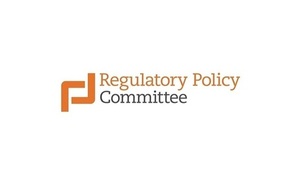Regulatory Policy Committee appointed as the independent body verifying the costs and savings of changes in law
Business and union leaders welcome statutory role for the Regulatory Policy Committee in government’s plans to cut £10 billion of red tape

Regulatory Policy Committee logo
Business and union leaders today welcomed the announcement that the Regulatory Policy Committee (RPC) has been appointed as the independent body charged with verifying the costs and savings of changes in law introduced by the Government that affect business – large and small – and civil society organisations. The RPC will provide independent assurance on the Government’s progress in meeting its commitment to cut £10 billion of red tape over the course of this parliament.
RPC chairman, Michael Gibbons CBE, said:
We are delighted to have been recognised for our long-standing achievements in providing expert advice to the Government, and providing business and civil society with confidence that an independent body is scrutinising and challenging the robustness of the evidence base for regulatory proposals that affect them.
The new mandate awarded to us will ensure that this important work continues on an enhanced statutory, footing ensuring that ministerial decisions on regulation are made on the best possible evidence base with regards to their impacts – intended or otherwise.
Sajid Javid, Secretary of State for Business, Innovation and Skills explained in his statement to Parliament this morning the rationale for selecting the RPC:
The RPC has experience and expertise in assessing the likely economic impact of regulation on business activities that is necessary to meet the statutory requirements of the verification body as set out in the Act.
Small Business, Industry and Enterprise Minister Anna Soubry said:
Needless burdens cost small businesses too much time and money and stop jobs being created for people. We’re committed to working with business to identify and cut red tape by £10 billion, and the Regulatory Policy Committee has an important part to play. They are a strong independent body and their scrutiny of our work should give businesses confidence.
Business leaders welcomed today’s appointment. John Cridland, Confederation of British Industry Director-General, said:
Businesses will welcome that the Regulatory Policy Committee will be using its strong voice to provide accountability and transparency in measuring the Government’s target to cut red tape.
Terry Scuoler, Chief Executive of the Engineering Employers Federation said:
Independent audit of the civil service’s sums is a good thing, and the RPC has proved already that it can effectively challenge over-optimistic advice to Ministers and Parliament. Giving the Committee statutory independence should reinforce that and Ministers are right to want to keep things honest and transparent as they take on the ambitious deregulation challenge they have set themselves. It is important for Britain’s competitiveness that they succeed, and this lays a good foundation.
Mike Cherry, Policy Director at the Federation of Small Businesses, said:
We are pleased to see the Regulatory Policy Committee get the legislative backstop it has long deserved. In our manifesto, FSB called for a more powerful RPC. It will now provide the transparent, accountable and independent challenge needed to push the better regulation agenda right across all parts of government.
The strengthened RPC is the right body to tackle the £10 billion deregulation target that the Government has promised.
Frances O’Grady, Trades Union Congress General Secretary, said:
We welcome this move, which will help protect the public interest. Regulation and deregulation may not sound like exciting topics, but bad regulation can be harmful for both workers and employers - and it can even infringe civil liberties. Putting the Committee on a formal statutory footing will help ensure that politicians respect the importance of its independent scrutiny and judgment.
About the RPC
The RPC provides the Government with external, independent scrutiny of new regulatory and deregulatory proposals.
The RPC assesses the quality of evidence and analysis supporting new regulatory and deregulatory proposals, and checks estimates for the equivalent annual net cost to business of new regulation. The RPC does this to ensure decisions are made on the basis of a robust, evidence-based policy-making process.
The committee of expert members includes a wide range of experience, including professional economists and representatives from small and large business, civil society, academia and the legal profession – all with considerable insight into the impact of regulation.